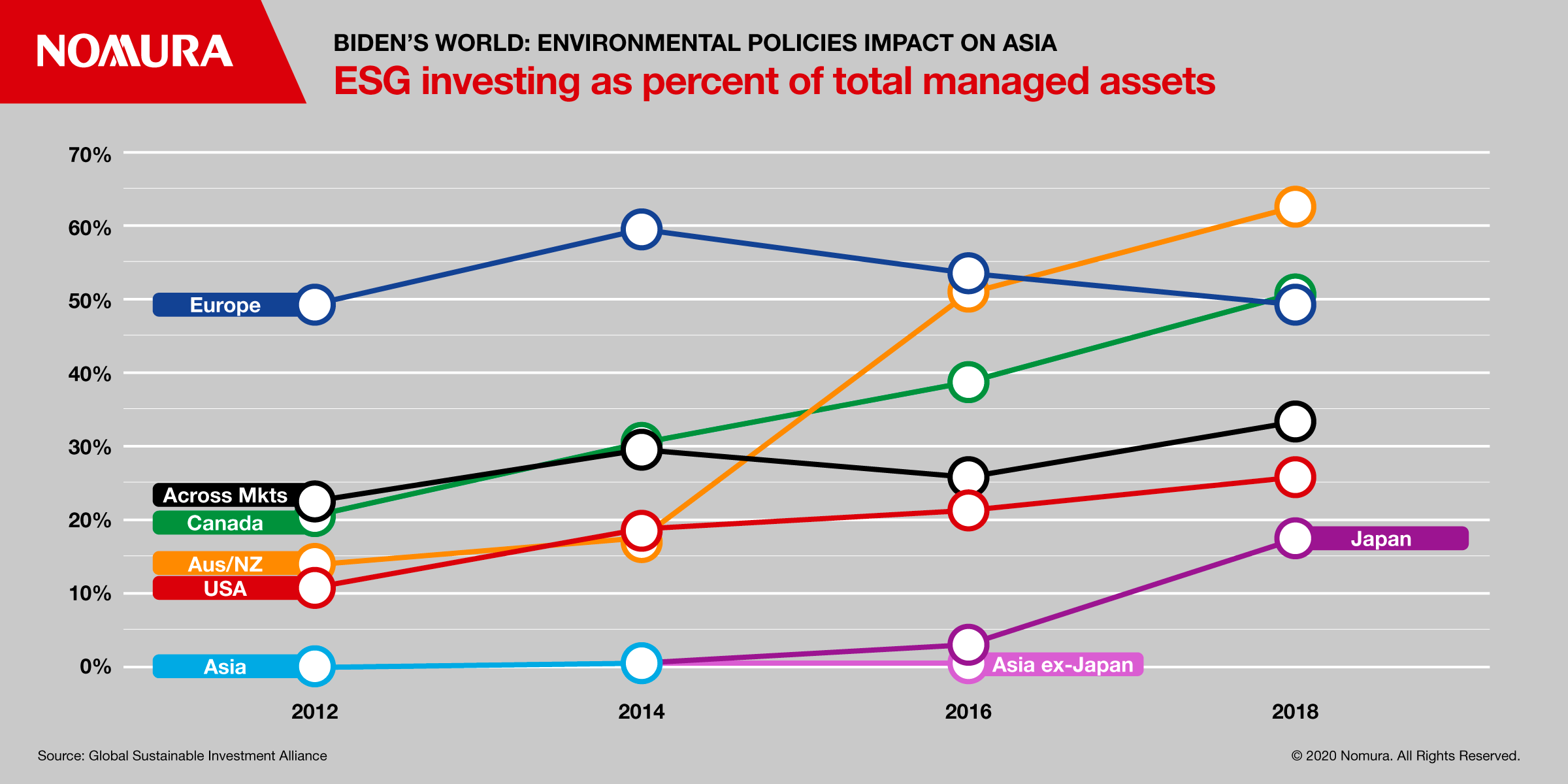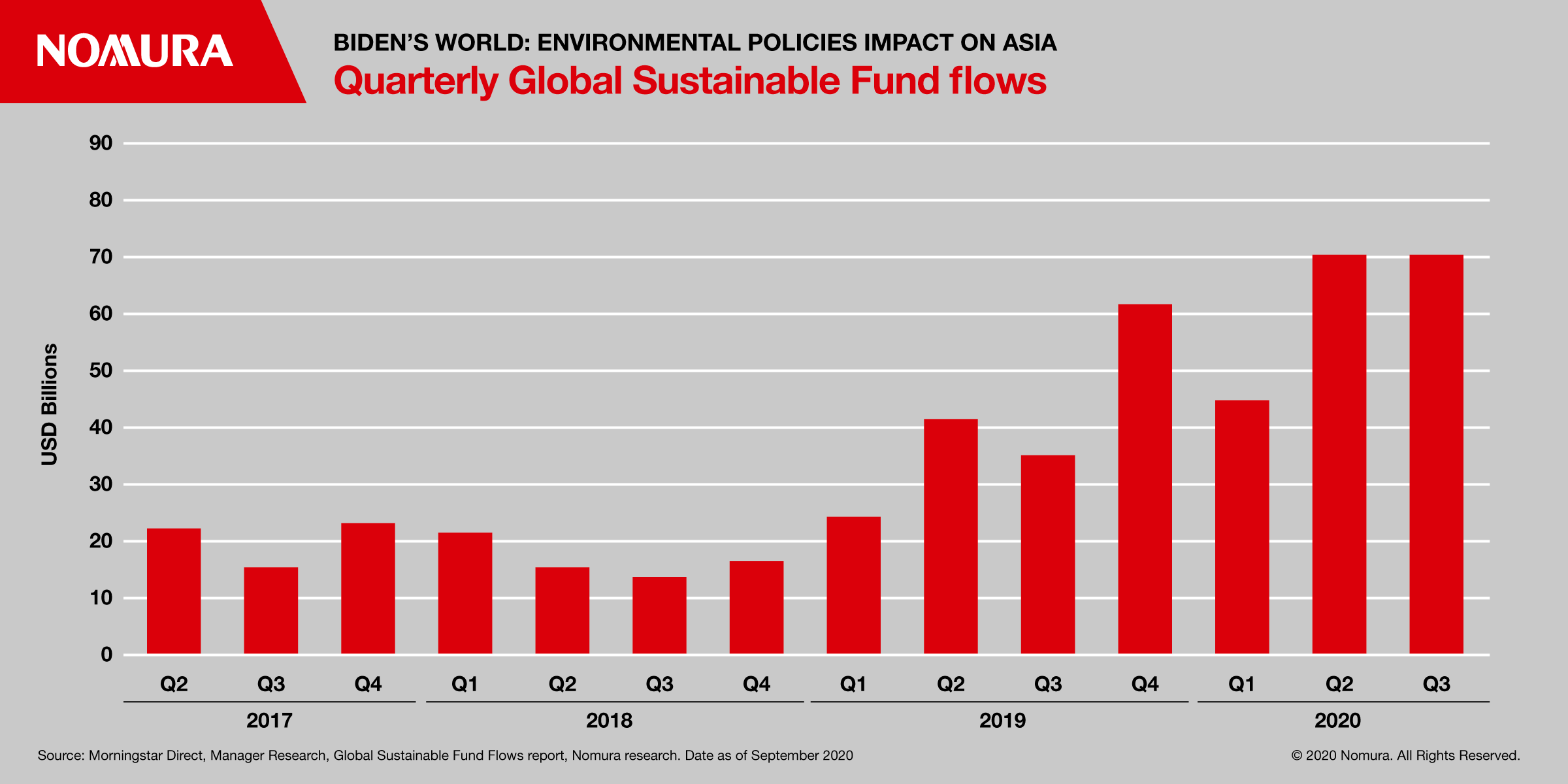
Biden’s Green Shift and its Impact on Asia
A pillar of US President Joe Biden’s bid for the presidency was the radical reform of US environmental policy, but what will it mean for Asia?
- After pledging to rejoin the Paris climate accord on his first day, we look at the longer term items on Biden's environmental agenda.
- What are the knock on effects of Biden's push on environmental policy for Asia?
- Which foreign and domestic industries most likely to be impacted by this push, and how will they evolve?
This article was produced in collaboration with

Biden has promised that under his administration the US will take the lead on climate issues, both at home and on the global stage. Such a change of tack for the US would have significant implications around the world, with much of the benefit being felt in Asia, and almost certainly accelerate current trends in sustainable finance and investing.
However, with the Senate now balanced 50-50, the new president cannot afford to lose a single Democratic vote, meaning the complete implementation of his program is far from a foregone conclusion.
As part of an ambitious shift to a clean energy economy, Biden’s agenda calls for more stringent auto emission standards, tax breaks for electric vehicles (EVs) and investing in charging infrastructure. Global EV battery manufacturing is concentrated in East Asia, with South Korea’s LG Chem, China’s CATL and Japan’s Panasonic accounting for nearly 70 percent between them. The three nations are also home to numerous makers of EVs themselves and components. In addition, Asia’s automakers and component suppliers - including Japan’s Denso, Aisin Seiki and Koito, and Korea’s Hyundai Mobis - will benefit from the quicker shift to more fuel-efficient and less polluting combustion engine vehicles.
“While we are currently seeing a lot of excitement in the stock market surrounding companies with a high exposure to EVs, we think fuel economy improvement for internal combustion engines would also be critically important to reduce CO2 over the next two decades. Thus investors should not lose sight of attractive investment opportunities in the conventional space that might crop up due to the skew towards EVs.”
And it is not only the US which is shifting course. The US’s goal of carbon neutrality by 2050 mirrors the commitment made by the EU, while Japan and South Korea have announced the same target, and China is aiming for 2060. This sea change amongst countries that account for more than half of global GDP will drive R&D and ESG investment across a broad range of sectors and industries, including renewable energy, sustainable construction and manufacturing, recycling and agriculture.
Energy production in all its forms is responsible for more than 70 percent of carbon emissions worldwide, so a greater focus on renewables and related tech is essential if countries are to reach their goals and avoid further rises in global temperatures. China is both the world’s largest solar power market and the biggest manufacturer of solar panels, Korea is a major exporter of parts for wind turbines, and there are leading green tech companies and promising start-ups to be found all across Asia.
During his presidential campaign, Biden also floated the idea of a carbon border adjustment mechanism to tax emission-intensive imports and therefore prevent cleaner and more efficient manufacturers from being disadvantaged. Although putting in place a mechanism for implementing a carbon-border tax will take a long time, The EU is examining a similar proposal, and if either or both follow through on their plans, Asia’s exporters will be heavily impacted and the demand for cleaner tech boosted.
Vast amounts of capital will be required as companies, industries and countries adjust to a more sustainability-focused business landscape. ESG-focused funds have fared well during the pandemic, attracting record inflows and outperforming their peers. The market for ESG funds, along with that for instruments such as green bonds and transition bonds, looks ripe for expansion as demand grows and investors become ever more aware of the risks of climate breakdown.
One potential barrier to progress on climate issues is the rocky US-China relationship that Biden inherits. The two economic powerhouses account for more carbon emissions than the next 20 countries combined, so cooperation between them on the issue is crucial.
“Managing the relationship with China will be one of the most important foreign policy challenges for the Biden Administration. Both China and President Biden have set the goal of achieving carbon neutrality, and addressing climate change will be an opportunity for the US and China to work together constructively.”
How the new president navigates this complex situation will impact the landscape for ESG investing in Asia and across the globe.
Contributor

Lewis Alexander
Chief US Economist

Anindya Das
US Auto sector analyst
Disclaimer
This content has been prepared by Nomura solely for information purposes, and is not an offer to buy or sell or provide (as the case may be) or a solicitation of an offer to buy or sell or enter into any agreement with respect to any security, product, service (including but not limited to investment advisory services) or investment. The opinions expressed in the content do not constitute investment advice and independent advice should be sought where appropriate.The content contains general information only and does not take into account the individual objectives, financial situation or needs of a person. All information, opinions and estimates expressed in the content are current as of the date of publication, are subject to change without notice, and may become outdated over time. To the extent that any materials or investment services on or referred to in the content are construed to be regulated activities under the local laws of any jurisdiction and are made available to persons resident in such jurisdiction, they shall only be made available through appropriately licenced Nomura entities in that jurisdiction or otherwise through Nomura entities that are exempt from applicable licensing and regulatory requirements in that jurisdiction. For more information please go to https://www.nomuraholdings.com/policy/terms.html.





